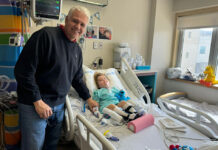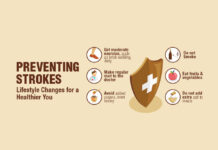
A guide to common health concerns that affect the men in your life.
by rob ayoup, nd
Men: it’s time to take charge! Fortunately it seems we are beginning to do so. Ladies: promptly proceed to give the men in your life this article to read. The fact that you are reading this attests to your desire to arm yourself with knowledge to protect yourself from the key health concerns affecting what literally defines you. We’re talking prostate and testicular health; concerns which are, of course, essential for you to be aware of.
WHAT LIES BELOW
Prostate inflammation, or prostatitis, is often caused by a bacterial infection, but can also be non-infectious in nature. Common signs and symptoms include fever, pain on ejaculation/urination, pain between anus and scrotum and a tender prostate during a physician examination. Prostate cancer can present itself as difficulties with urinary flow, uneven enlargement of the prostate gland and high levels of a biochemical marker known as PSA, detected on blood work. Testicular cancer can manifest as a painless mass in the testicle or scrotum sac. Risk factors for testicular cancer include history of an undescended testicle (where the testicle does not travel down into the scrotal sac during fetal development), genetic anomalies and HIV infection. The Canadian Cancer Society estimates that just under 30 percent of diagnosed cancers in 2009 will be for prostate cancer and one percent for testicular cancer. However, since 1992, nearly 25 percent of cancers diagnosed in the male 15-to-29-age range have been for testicular tumors. Meanwhile, prostate inflammation (prostatitis) is believed to affect 10 to 30 percent of men and is among the most common health concerns for men under 50. A preventative strategy would include monthly testicular self-examinations, and for men over 50 to receive annual PSA testing and a physician-administered rectal examination. Myths can prevail in our society, so it is important to mention that trauma to the testicles does not lead to cancer, and prostate enlargement is a normal (albeit symptomatic) occurrence as we age, but does not increase the risk of prostate cancer itself.
FOOD MATTERS
Functional foods offer a specific medical benefit over and above the basic nutritional value a food provides. In the case of prostate cancer, evidence points to the consumption of those foods listed in the following table to help curb the risk.
For prostatitis and testicular cancer, a diet high in antioxidants (fruits and veggies of various colours, especially dark purple and red) and fish oils, with minimal animal product consumption, can provide the context for reducing prostate inflammation as well as overall cancer risk.
THINK OUTSIDE THE BOX}Supplements and alternative treatments
Prostate Cancer:
Lycopene – Lycopene (tomatoes are an excellent source!) is an antioxidant that can reduce tumor size and prevent progression of early stage prostate cancer. No drug interactions have been documented.
Vegetarian Challenge – Evidence shows that a unique form of linolenic acid, a fat found in dairy and meat products, increases prostate cancer risk, highlighting the cancer-reducing qualities of a veg diet.
Veggie-based meat-like products – Fish and beans can tackle the meat cravings while soy, rice, hemp and almond milks and yogurts can account for the dairy alternates.
Prostate inflammation:
Quercetin – Another antioxidant with documented ability to reduce pain of chronic, non-bacterial prostate inflammation, with no major drug interactions documented.
Probiotics (Acidophilus/Bifidus) –Use during, and for three-to-four weeks after antibiotic use to prevent related complications like diarrhea, at a different time from antibiotics for maximum effect.
Acupuncture – An effective method to manage inflammation and pain; points used would often be over the lower back and abdomen.
Testicular Cancer:
Immune-focused Greens powders –
Often contains a mixture of herbs and nutrients geared toward immune support, such as green tea extract, concentrated berry antioxidants and maitake and reishi
Mushroom extracts– Immune support is essential given its role in primary detection and elimination of uncontrolled cancer cell replication.
Yoga – Studies for use as an adjunctive cancer therapy have shown reduced chemotherapy-induced nausea/vomiting, improved quality of life, and reduced pain and fatigue.











